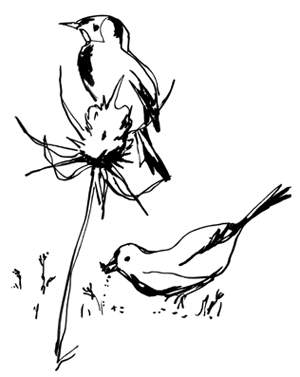6. My Neighbor's Field
It is one of those places God must have meant for a field from all time, lying very level at the foot of the slope that crowds up against Kearsarge, falling slightly toward the town. North and south it is fenced by low old glacial ridges, boulder strewn and untenable. Eastward it butts on orchard closes and the village gardens, brimming over into them by wild brier and creeping grass. The village street, with its double row of unlike houses, breaks off abruptly at the edge of the field in a footpath that goes up the streamside, beyond it, to the source of waters.
The field is not greatly esteemed of the town, not being put to the plough nor affording firewood, but breeding all manner of wild seeds that go down in the irrigating ditches to come up as weeds in the gardens and grass plots. But when I had no more than seen it in the charm of its spring smiling, I knew I should have no peace until I had bought ground and built me a house beside it, with a little wicket to go in and out at all hours, as afterward came about.
Edswick, Roeder, Connor, and Ruffin owned the field before it fell to my neighbor. But before that the Paiutes, mesne lords of the soil, made a campoodie by the rill of Pine Creek; and after, contesting the soil with them, cattle-men, who found its foodful pastures greatly to their advantage; and bands of blethering flocks shepherded by wild, hairy men of little speech, who attested their rights to the feeding ground with their long staves upon each other's skulls. Edswick homesteaded the field about the time the wild tide of mining life was roaring and rioting up Kearsarge, and where the village now stands built a stone hut, with loopholes to make good his claim against cattlemen or Indians. But Edswick died and Roeder became master of the field. Roeder owned cattle on a thousand hills, and made it a recruiting ground for his bellowing herds before beginning the long drive to market across a shifty desert. He kept the field fifteen years, and afterward falling into difficulties, put it out as security against certain sums. Connor, who held the securities, was cleverer than Roeder and not so busy. The money fell due the winter of the Big Snow, when all the trails were forty feet under drifts, and Roeder was away in San Francisco selling his cattle. At the set time Connor took the law by the forelock and was adjudged possession of the field. Eighteen days later Roeder arrived on snowshoes, both feet frozen, and the money in his pack. In the long suit at law ensuing, the field fell to Ruffin, that clever one-armed lawyer with the tongue to wile a bird out of the bush, Connor's counsel, and was sold by him to my neighbor, whom from envying his possession I call Naboth.
